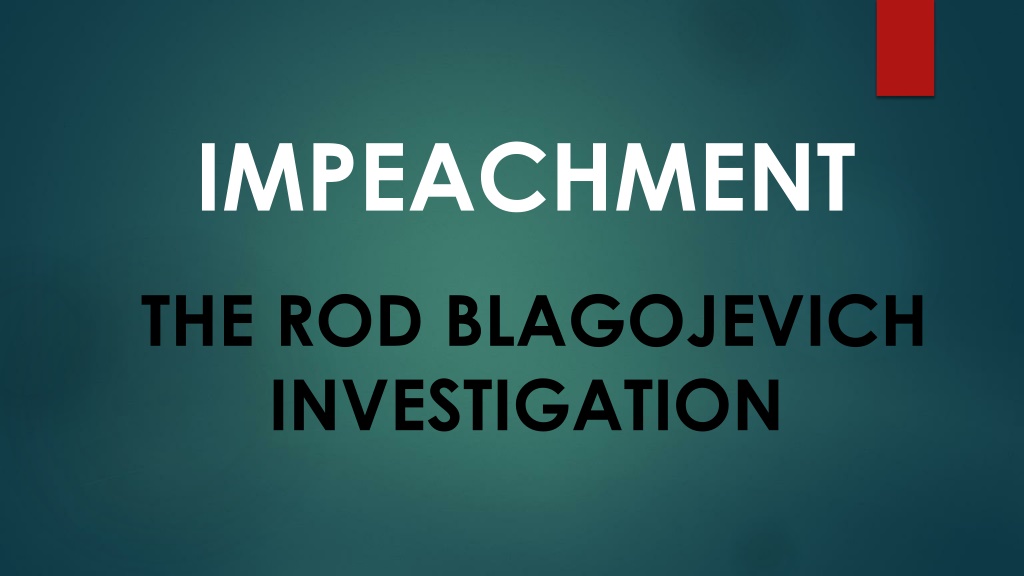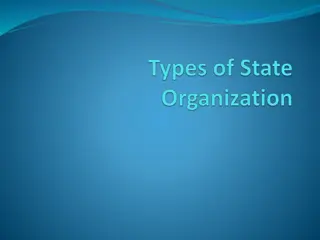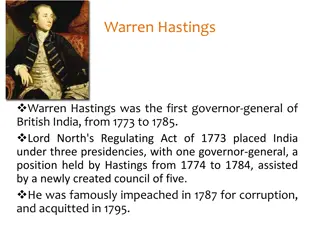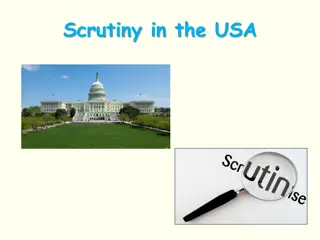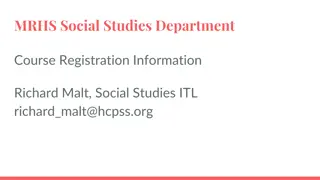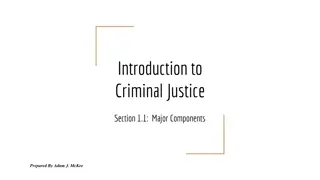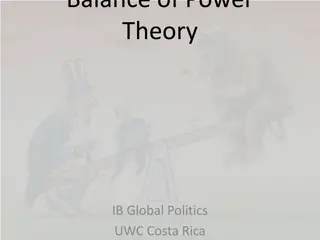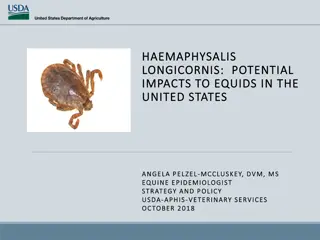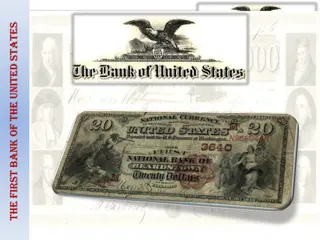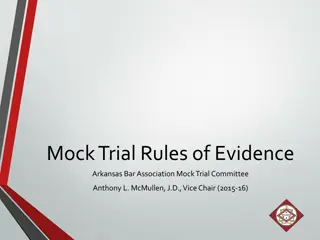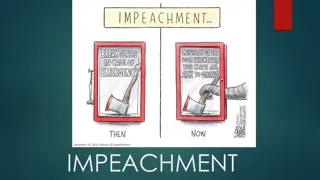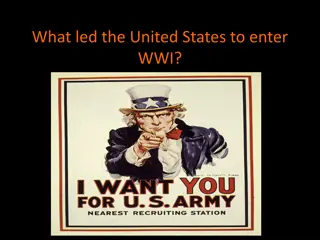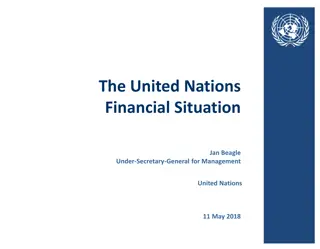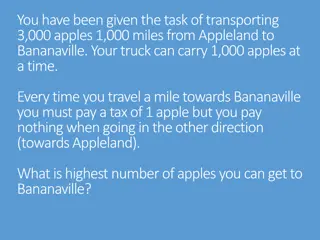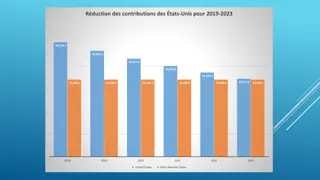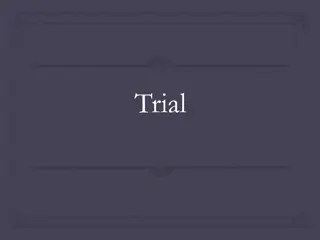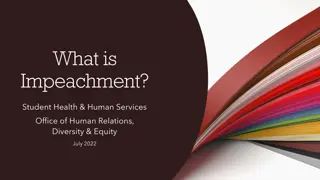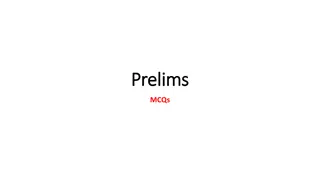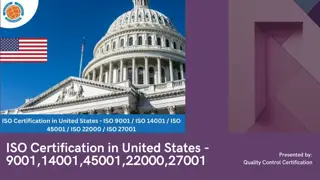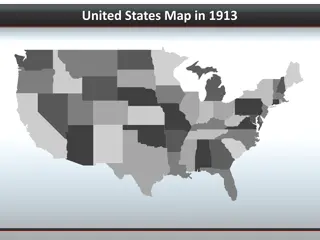Understanding Impeachment in the United States
Impeachment is a formal accusation of wrongdoing against a public official in the United States. This process involves the House of Representatives voting to impeach, with the Senate conducting the trial. It can apply to the President, Vice President, and civil officers for offenses such as treason, bribery, and high crimes. The impeachment process includes specific steps and criteria for removal from office, encompassing charges like high crimes and misdemeanors. Rod Blagojevich's case serves as an example that highlights the legal and political implications of impeachment.
Download Presentation

Please find below an Image/Link to download the presentation.
The content on the website is provided AS IS for your information and personal use only. It may not be sold, licensed, or shared on other websites without obtaining consent from the author. Download presentation by click this link. If you encounter any issues during the download, it is possible that the publisher has removed the file from their server.
E N D
Presentation Transcript
IMPEACHMENT THE ROD BLAGOJEVICH INVESTIGATION
WHAT is Impeachment? A formal accusation of wrongdoing against a public official. According to the United States Constitution, the House of Representatives can vote to impeach an official, but the Senate actually tries the case.
WHO can be impeached? At the federal level, Article II of the United States Constitution states in Section 4 that "The President, Vice President, and all civil Officers of the United States shall be removed from Office on Impeachment
WHY can someone be Impeached? "Treason, Bribery or other high Crimes and Misdemeanors" (Article II, Section 4). These formal accusations are codified as articles of impeachment
High Crimes and Misdemeanors Charge that covers allegations of misconduct peculiar to officials, such as perjury of oath, abuse of authority, bribery, intimidation, misuse of assets, failure to supervise, dereliction of duty, conduct unbecoming, and refusal to obey a lawful order. Dereliction of duty abandoning duties/responsibilities. Neglect, failure, negligence
Impeachment Process The U.S. Constitution provides impeachment as the method for removing the president, vice president, federal judges, and other federal officials from office. The impeachment process begins in the House of Representatives and follows these steps: The House Judiciary Committee holds hearings and, if necessary, prepares articles of impeachment. These are the charges against the official. If a majority of the committee votes to approve the articles, the whole House debates and votes on them. If a majority of the House votes to impeach the official on any article, then the official must then stand trial in the Senate. For the official to be removed from office, two-thirds of the Senate must vote to convict the official. Upon conviction, the official is automatically removed from office and, if the Senate so decides, may be forbidden from holding governmental office again.
Rod Blagojevich 1986: Cook County Assistant State s Attorney 1996: Elected to US House of Representatives 2003-2009: Governor of Illinois, 2 Terms First Democrat to be elected Gov. of IL in 30 years
Group Activity Read and discuss Illinois Senate Transcripts Create a poster with predictions of WHY Rod was on trial in front of the Senate What did he do to deserve these charges? Include pictures, symbols, phrases, etc. Choose Roles Reader Note-taker Illustrator Presenter *CAN COMBINE ROLES Present to the class your findings/predictions HAVE FUN!!
Closing Arguments https://www.c-span.org/video/?283734-1/illinois- impeachment-prosecutor-closing-argument https://www.c-span.org/video/?283734-2/governor- blagojevich-closing-remarks House Prosecutor, David Ellis Governor Rod Blagojevich
SO What really happened? http://www.ilga.gov/legislation/96/HR/PDF/09600HR0005.pdf Rod R. Blagojevich, has abused the power of his office in some or all of the following ways 13 Abuses of Power sited 60 phone conversations all related to plots by the Governor to use his official acts to further his own personal gain. House Prosecutor MOST NOTABLE: Attempting to trade President-elect Barack Obama's newly vacant senatorial seat in return for campaign contributions and a high-paying job for his wife. Transcripts of phone conversations also revealed that Blagojevich threatened to block financial assistance to the company that owns the Chicago Tribune newspaper, unless they fired members of the paper's editorial board who criticized the governor.
The Purpose of Impeachment A system of checks and balances among the three branches of government that mirrors the federal system and prevents any branch from abusing its power. Important to know how the system works Learn from others experiences even if it doesn t happen to YOU!
Impeachment Assignment Robert W. Archbald 9. William Blount 1. George W. English 10. John Pickering 2. Harold Louderback 11. Samuel Chase 3. Halsted L. Ritter 12. James H. Peck 4. Harry E. Claiborne 13. West H. Humphreys 5. Alcee L. Hastings 14. Andrew Johnson 6. Walter L. Nixon Jr. 15. William H. Belknap 7. William J Clinton 16. Charles Swayne 8.
Bring information (printed or hand copied) for HW grade*** **We will be writing on a piece of paper. If you want to type it up and bring on Friday, you can for extra credit. education family political parties dates impeached? why? how? activities involved in personality traits etc printed pic
Vocabulary Alleged or Allegedly something claimed to have taken place, but no proof. Supposedly or apparently are synonyms Unrebutted not disproved
